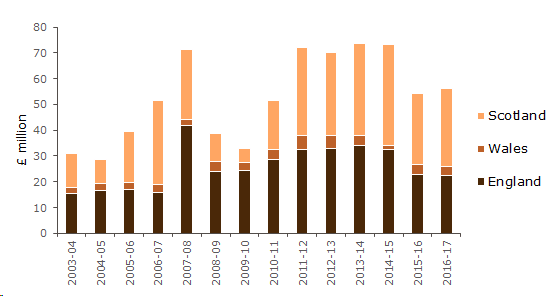Private sector woodland in Great Britain is supported by a range of grants for creating new woodland and managing existing woodland. The Woodland Grant Scheme (WGS) was introduced in 1988, at the same time as tax relief was phased out. In Scotland, WGS was replaced by the Scottish Forestry Grant Scheme (SFGS) in 2003, by Rural Development Contracts in 2008 and has now been replaced by the Forestry Grant Scheme. The English Woodland Grant Scheme (EWGS) was launched in July 2005 and has now been replaced by Countryside Stewardship. Better Woodlands for Wales (BWW) was launched in December 2005 and has now been replaced by Glastir (administered by the Welsh Government).
Because of the differences between these schemes, it is increasingly difficult to provide comparable statistics across the three countries. The following tables provide useful information relating to planting and grants:
Table 8.6 presents information on grant money paid in 2007-08 to 2016-17. A total of £56.2 million was paid in grants in 2016-17, a 4% increase from the total for the previous year, but lower than the level in 2011-12 to 2014-15.
At a country level, £30.5 million was paid in grants in Scotland in 2016-17 (an increase of 11% from the previous year), £22.5 million was paid in England (a 2% decrease) and £3.3 million in Wales (a decrease of 8%).
Table 8.6 Grant money paid, 2007-08 to 2016-17
| England1 | Wales2 | Scotland3 | GB | |
| £ million | ||||
| 2007-08 | 41.7 | 2.6 | 26.9 | 71.1 |
| 2008-09 | 24.1 | 3.7 | 10.9 | 38.7 |
| 2009-10 | 24.4 | 2.9 | 5.7 | 33.0 |
| 2010-11 | 28.7 | 3.8 | 18.9 | 51.4 |
| 2011-12 | 32.5 | 5.4 | 34.2 | 72.1 |
| 2012-13 | 32.8 | 5.0 | 32.3 | 70.1 |
| 2013-14 | 33.9 | 4.1 | 35.5 | 73.5 |
| 2014-15 | 32.4 | 1.8 | 39.2 | 73.4 |
| 2015-16 | 23.0 | 3.6 | 27.5 | 54.1 |
| 2016-17 | 22.5 | 3.3 | 30.5 | 56.2 |
Source: Forestry Commission, Natural Resources Wales
Notes:
1. England includes grant scheme expenditure managed by the Forestry Commission on behalf of Defra.
2. Wales includes grant paid under the Nature Fund programme for woodland creation in 2015-16.
3. Scotland includes grants paid under the Forestry Grant Scheme and legacy schemes (including Rural Development Contracts).
The total grant money paid in Great Britain has fluctuated over recent years, with levels often dipping around the times that new grant schemes are introduced, followed by a sharp recovery.
Figure 8.3 Grant money paid, 2003-04 to 2016-17

Source: Forestry Commission, Natural Resources Wales
Notes:
1. England includes grant scheme expenditure managed by the Forestry Commission on behalf of Defra.
2. Wales includes grant paid under the Nature Fund programme for woodland creation in 2015-16.
3. Scotland includes grants paid under the Forestry Grant Scheme and legacy schemes (including Rural Development Contracts).